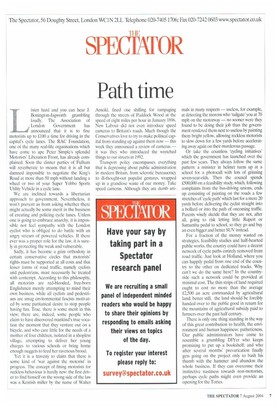Path time
Listen hard and you can hear J. Bonington-Jagworth grumbling loudly. The Association of London Government has announced that it is to fine motorists up to £100 a time for driving in the capital's cycle lanes. The RAC Foundation, one of the many real-life organisations which have come to ape Peter Simple's splendid Motorists' Liberation Front, has already complained. Soon the dinner parties of Fulham will reverberate to moans that it is all but damned impossible to negotiate the King's Road at more than 50 mph without landing a wheel or two of your Super Yobbo Sports Utility Vehicle in a cycle lane.
We are inclined towards a libertarian approach to government. Nevertheless, it won't prevent us from asking whether there might actually be some merit in the business of creating and policing cycle lanes. Unless one is going to embrace anarchy, it is impossible not feel sympathy with the London cyclist who is obliged to do battle with an angry stream of powered vehicles. If there ever was a proper role for the law, it is surely in protecting the weak and vulnerable.
Sadly, it has become a grim orthodoxy in certain conservative circles that motorists' rights must be supported at all costs and that lesser forms of road traffic, namely cyclists and pedestrians, must necessarily be treated with contempt. According to this philosophy, all motorists are red-blooded, free-born Englishmen merely attempting to mind their own business, while all cyclists and pedestrians are smug environmental fascists motivated by some puritanical desire to stop people having fun. True, there is some merit in this view; there are, indeed, some people who claim to have discovered mankind's true vocation the moment that they venture out on a bicycle, and who care little for the needs of a mother of four children, isolated in a shopless village, attempting to deliver her young charges to various schools or bring home enough nuggets to feed her ravenous brood.
Yet it is a travesty to claim that there is some kind of `war against the motorist' in progress. The concept of fining motorists for reckless behaviour is hardly new: the first driver to find himself on the wrong side of the law was a Kentish miller by the name of Walter Arnold. fined one shilling for rampaging through the streets of Paddock Wood at the speed of eight miles per hour in January 1896. New Labour did not even introduce speed cameras to Britain's roads. Much though the Conservatives love to try to make political capital from standing up against them now — this week they announced a review of cameras — it was they who introduced the wretched things to our streets in 1992.
Transport policy encompasses everything that is depressing about public administration in modern Britain, from sclerotic bureaucracy to ill-thought-out populist gestures, wrapped up in a grandiose waste of our money. Take speed cameras. Although they are dumb ani
mals in many respects — useless, for example, at detecting the morons who 'tailgate' you at 70 mph on the motorway — no sooner were they found to be doing their job than the government rendered them next to useless by painting them bright yellow, allowing reckless motorists to slow down for a few yards before accelerating away again on their murderous passage.
Or take the countless 'cycling initiatives' which the government has launched over the past few years. They always follow the same pattern: a minister in helmet turns up at a school for a photocall with lots of grinning seven-year-olds. Then the council spends £500,000 on a feasibility study, which, following complaints from the bus-driving unions, ends up consisting of painting on the roads a few stretches of 'cycle path' which last for a mere 20 yards before delivering the cyclist straight into a bollard or into the path of oncoming traffic. Parents wisely decide that they are not, after all, going to risk letting little Rupert or Samantha pedal to school, so they go and buy an even bigger and better SUV instead.
For a fraction of the money wasted on strategies, feasibility studies and half-hearted public works, the country could have a decent network of cycle paths entirely removed from road traffic. Just look at Holland, where you can happily pedal from one end of the country to the other on dedicated tracks. Why can't we do the same here? In the countryside such a network could be provided at minimal cost. The thin strips of land required ought to cost no more than the average £2,500 an acre commanded by agricultural land; better still, the land should be forcibly handed over to the public good in return for the mountains of agricultural subsidy paid to farmers over the past half century.
There is only one thing standing in the way of this great contribution to health, the environment and human happiness: patheticness. Our public administrators have come to resemble a grumbling DIYer who keeps promising to put up a bookshelf; and who after several months' prevarication finally gets going on the project only to bash his thumb with the hammer and abandon the whole business. If they can overcome their instinctive nastiness towards non-motorists, perhaps cycle paths might even provide an opening for the Tories.


























































 Previous page
Previous page